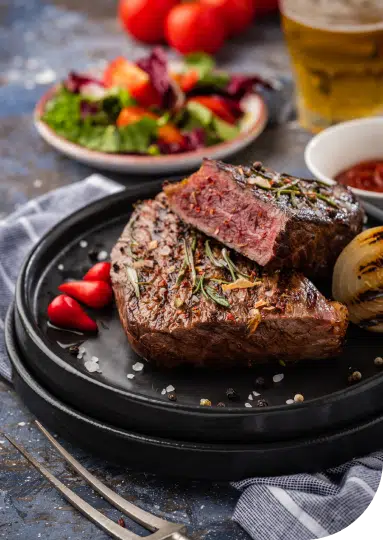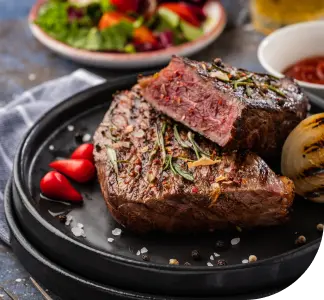Mesothelioma Diet and Nutrition
For patients with mesothelioma, diet and nutrition are vital for ensuring the body has the energy and nutrients it needs to fight cancer cells and heal from the effects of cancer and treatments. Patients should get a proper amount of calories, protein, and micronutrients (vitamins and minerals) to support their bodies during treatment.
Home » National Mesothelioma Law Firm » Mesothelioma Cancer » Mesothelioma Diet and Nutrition
After a person is diagnosed with mesothelioma, they often focus more on their health, including what they eat daily. Patients may wonder if there is a particular mesothelioma diet they should follow to help with the effects of cancer.
Although food is not a “magic bullet” that can eliminate cancer cells, how you eat during your mesothelioma treatment can impact how you feel. It may also increase the likelihood of a good outcome, as certain foods can support your body while fighting the cancer and healing from the effects of its treatment.
Can foods cure mesothelioma?
Some patients have heard that certain foods are “cancer-fighting” and may want to start consuming these as part of their treatment plan for mesothelioma. It can be tempting to believe that simply changing how you eat can cure your cancer, especially if you’re nervous about the potential side effects of mesothelioma treatment.
Unfortunately, no specific mesothelioma nutrition or diet plan has been shown to increase life expectancy in patients with this type of cancer. If you have this disease, the only way to extend your life expectancy is through proven treatment methods like surgery, chemotherapy, and radiation therapy. No matter what you’re eating, it’s still important to stick with your cancer treatment plan and keep your cancer care appointments.
However, what you eat still matters. You must support your body during your mesothelioma cancer treatment by getting proper nutrition. This will help your body fight cancer cells and cope with the side effects of mesothelioma treatment. Eating a nutritious diet is one way to help maintain your health as you go through your cancer treatment journey.
What should I eat if I have mesothelioma?
According to the American Cancer Society, when you’re undergoing treatment for cancer, the most important factors in food consumption are calories, protein, and micronutrients (vitamins and minerals) to support your body’s functioning.
Calories
For cancer patients, you must eat enough calories. Cancer cells can consume a lot of energy, leaving your body with fewer resources. The cancer cells may use too many calories that the patient doesn’t have enough left to survive. It also takes a lot of energy for your body to fight cancer and to heal from the damage caused by surgeries and other treatments.
It can sometimes be challenging to get enough calories during cancer treatment. It’s common for medicines to cause nausea and vomiting, which may make it difficult to eat. Tips for ensuring you get enough calories:
- Take advantage of when your stomach is feeling better, and try to eat
as much as possible. - Eat several small snacks throughout the day rather than trying to eat
just a few meals. - Don’t wait until you feel hungry to eat. Try to eat every few hours,
even if you’re not feeling hungry yet. - Try taking a walk before a meal to help increase your appetite.


If you try these methods and you’re still losing a significant amount of weight during your cancer treatment, your treatment team might recommend nutrition bars, shakes, or puddings designed to help you get more caloric intake.
Supportive Care in Cancer states that cancer patients who lose weight are less likely to survive, which is why it’s crucial to maintain as much weight as possible. Although small fluctuations in weight during treatment are expected, significant weight loss should be taken seriously.
Even if you were overweight before you were diagnosed with mesothelioma, trying not to lose weight during your treatment is best. Your body needs all the resources it can get to fight cancer and give you the best possible chances of a good outcome.
Protein
Proteins are the building blocks of cells. This is why your body needs plenty of protein to heal from cancer and its treatment. Cancer cells use protein when they divide, so you need to ensure you get enough for your own cells.
Clinical Nutrition shares examples of good protein sources:
- Meat
- Poultry (such as chicken and turkey)
- Fish
- Eggs
- Dairy (such as yogurt and cheese)
- Beans
- Lentils
- Peanut butter
- Nuts


Micronutrients
Micronutrients are substances that you need in relatively small amounts to be healthy. These include a variety of vitamins and minerals. Micronutrients are essential for immune system function, which can help the body attack cancer cells and prevent infections. They’re also important for other functions throughout the body.
Fruits and vegetables are excellent sources of micronutrients. There’s no particular food that’s best for fighting cancer; eating various fruits and vegetables daily is the best approach. Try to include as many different colors as you can to get as many different nutrients as possible.
A study published in Nutrition Journal revealed that eating more fresh fruits and vegetables significantly reduced the risk of developing cancer. Specific plant foods that seem to be particularly helpful for reducing cancer risk include:
- Allium vegetables (such as garlic, onions, leeks, and scallions)
- Carrots
- Green leafy vegetables
- Cruciferous vegetables (such as broccoli, cauliflower, Brussels sprouts,
and cabbage) - Tomatoes


Food Safety During Mesothelioma Treatment
Your immune system may be suppressed during treatment due to the effects of cancer and certain treatments (like chemotherapy). Because of this, you’ll need to be more careful about food safety during this time. You’re more likely to contract an infection from contaminated food than before you had cancer, and any infections you get are more likely to become serious.
According to the American Cancer Society, there are a few steps you can take to protect yourself from food-borne illnesses during your mesothelioma treatment:
- Always wash your hands thoroughly before you prepare food and before you eat.
- Cook all foods thoroughly, particularly meat. Make sure you stir foods in the microwave halfway through their cooking time to
ensure there are no cold spots where bacteria could survive. - Wash fruits and vegetables well before you eat them.
- Refrigerate cold foods promptly. Don’t eat food that’s been out of the refrigerator for longer than an hour or two.
- Always use clean utensils, dishes, and cutting boards.
- Don’t buy prepared foods from the deli or fruit or vegetables that have been pre-cut.
- Don’t eat any food that’s even slightly moldy or rotten or has an “off” smell. If you’re unsure whether a food is safe, don’t eat it.
Should you take vitamins or supplements during mesothelioma treatment?
Taking supplements containing vitamins and minerals is a common way to get enough nutrients. Herbal supplements are also popular; many people see them as harmless, natural alternatives to pharmaceuticals.
Some supplements may be beneficial during cancer treatment. For example, placebo-controlled studies presented in Supportive Care in Cancer have found that ginger can reduce nausea associated with chemotherapy. Cancer Treatment Centers of America support the notion that the mineral selenium can protect cells from toxicity associated with radiation therapy or chemotherapy and may even enhance the effects of the treatment.
However, it’s also important to know that certain herbs (including ginkgo, ginseng, echinacea, and kava) can interact with cancer medications, reducing their effectiveness or increasing the side effects. This is why it’s crucial to talk with your treatment team before taking any herbal supplement to ensure it’s a safe choice.
For instance, a study of breast cancer patients published in the Journal of Clinical Oncology showed the dangers of taking supplements during cancer treatment. Patients who took iron during their chemotherapy had a significantly higher recurrence rate, while those who took vitamin B12 or an antioxidant supplement (vitamins A, C, or E, or coenzyme Q10) had lower survival than those who didn’t take these vitamins.
Although it may seem like a good idea to take extra vitamins and minerals just to ensure you get enough, too much may be dangerous, and it’s crucial for people undergoing cancer treatment to be careful with supplements.
Talk With Your Treatment Team
In general, a cancer treatment team will include a nutritionist, a professional specializing in diet and nutrition. If you have any questions about how you should be eating during your treatment, don’t hesitate to ask your nutritionist. They are experts in this field and will be happy to help you address any challenges and find an eating plan that will work well for you and your treatment journey.
By submitting this form, you agree to our terms & conditions. Please read the full disclaimer



